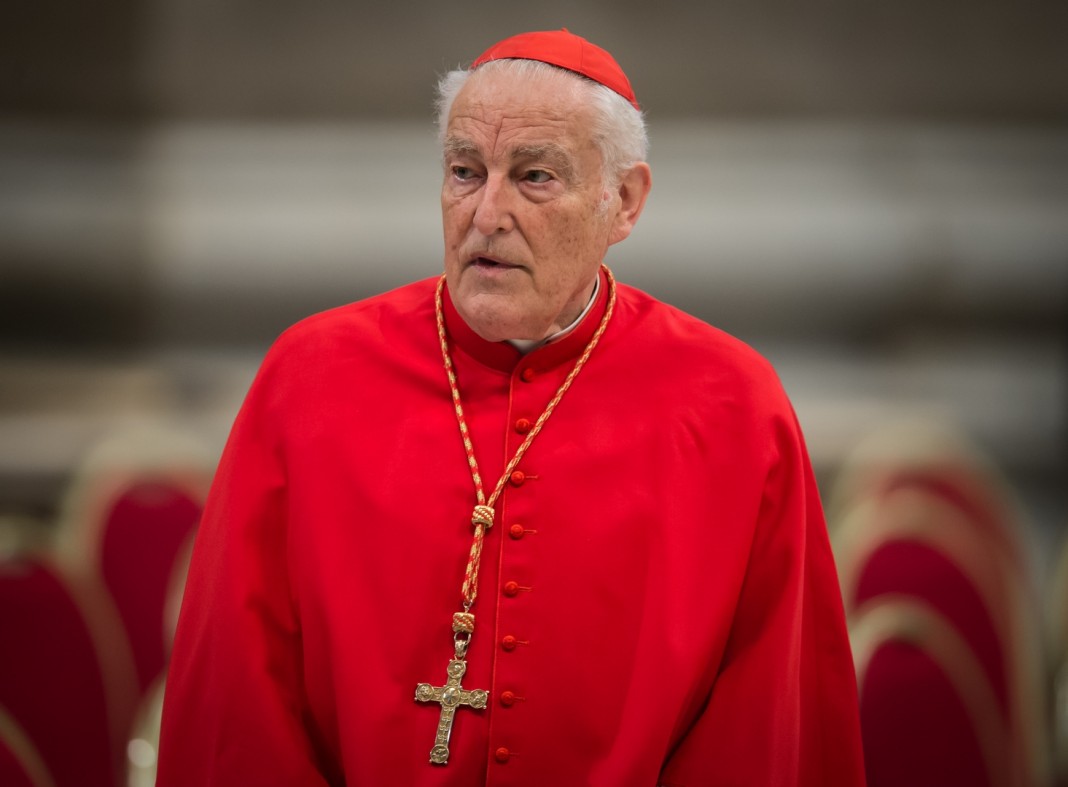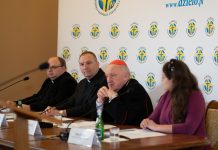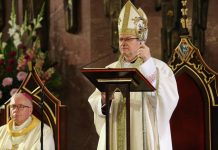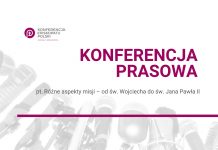Card. Zenon Grocholewski. „GOD RICH IN MERCY”.
Sermon during Holy Mass ending days in the Poznań Archdiocese that are part of WYD, Poznań, 24 July 2016.
God abounding in forgiveness
Holy Father Francis in his message from a few days ago addressed to you on the occasion of his trip to Poland for the thirty-first World Youth Day said „everything will take place under the symbol of Mercy, in this Jubilee Year.” He also noted „you have been preparing for the big meeting in Krakow for a long time now, especially through prayer,” as if he wanted to say that prayer is the foundation or condition for us to be able to experience and to be shown God’s Mercy.
This thought is also expressed in the first reading of today’s Holy Mass (Gen 18:20-32). The Lord intends to destroy Sodom and Gomorrah for the general immorality and wickedness of its inhabitants. And then Abraham vehemently pleads with God to save them. He wants to save the innocent who live in these cities as well as the cities as a whole. He asks God: „Will you sweep away the innocent with the guilty? What if there are fifty innocent people in the city? Will you really sweep it away and not save the place for the sake of the fifty innocent people in it? […] It’s not like you to do this, killing the innocent with the guilty as if there were no difference. It’s not like you!” And Abraham is not satisfied with God’s response: „If I find fifty innocent people in the city of Sodom, I will save it because of them,” and keeps asking: „What if there are five fewer innocent people than fifty? Will you destroy the whole city over just five?” Then he goes on: „What if forty are there?”, and persists: „What if thirty are there?”, and still: „What if twenty are there?”. His persistent pleading does not end here: „What if there are ten?”.
This scene is very vivid, reminiscent of haggling in Palestinian markets (those of you who have been to the Holy Land must have come across such scenes). It makes the people of the Old Testament aware of two very important truths. Fist, the immensity of God’s Mercy, and more specifically God’s readiness to forgive, a readiness that is boundless: for the sake of ten innocents, the Lord is prepared to save Sodom and Gomorrah. Second, this scene illustrates the significance and power of prayer capable of entreating mercy: God has heard Abraham’s fervent intercessions and has granted his forgiveness to him.
This Old Testament description is, in a sense, a prelude to today’s Gospel reading (Lk11:1-13). The reading that takes us to the reality of the New Testament. Here Jesus teaches us to pray „Our Father.” His teaching highlights two truths: the power of prayer and God’s Mercy; the power of prayer in entreating forgiveness for which Jesus tells us to pray („forgive us our sins”). Jesus says in very categorical terms: „As and you will receive. Seek and you will find. Knock and the door will be opened to you. Everyone who asks, receives. Whoever seeks, finds. To everyone who knocks, the door is opened.” Jesus’ words show us the power of prayer and the vastness of God’s Mercy, who comes to the aid of our needs, our weaknesses, always ready to forgive.
Having this in mind, I would like to make one observation regarding prayer and one concerning forgiveness. Both point to something new found in today’s reading of the Gospel which is non-existent in the first reading of the Old Testament.
„When you pray, say, Our Father …”
Jesus asked „Lord, teach us to pray,” says: „When you pray, say, Our Father…”. Say: Father! This is extraordinary: God, who created heaven and earth, who is omnipotent, omniscient, who is the Master of everything, this God we are allowed to address as „Father.” What is more, not only are we allowed to address Him like that, but we should address Him in this way: „Say, Our Father.” No one addressed God as „Father” in the Old Testament. In no religion is God called Father. But we may and should call God „Father” with the simplicity of children. This is really an extraordinary thing.
Perhaps for some people, the word „Father” does not mean a lot; maybe they do not see the richness expressed by this word, either because its value has been depreciated in certain communities, or because they lack the experience of having a father, or that they have had a bad experience relating to their father in their own family.
„We must therefore let Jesus teach us what father really means.” (Pope Benedict XVI, Jesus from Nazareth: from the Baptism in the Jordan to the Transfiguration. Translated by Adrian J. Walker. New York: Doubleday, 2007, p. 136). In Jesus’ speeches, the Father manifests itself as a source of all good, as a model of the perfect man, as the one who is „Love”, as the one who has loved us until the end, who waits for the Prodigal Son to embrace him and forgive him everything, who „causes his sun to rise on the evil and the good,” who wants to give himself to us.
We recognise this Father in the Son, Jesus Christ, as in a mirror. At the Last Supper, when Philip asks Jesus „to show us the Father,” Jesus says, „He who sees me sees the Father. […] I am in the Father and the Father is in Me” (Ibid., ss. 121-122).
Until our heart learns to deeply feel and know this truth that God is our Father, that He really is Our Father, the Father as Christ has shown Him to us, we will always have a problem with prayer, because you can only talk in a straightforward, spontaneous, sincere way with someone who is close to you, someone who we are sure is well-disposed towards us and someone whom we can count on. Once we realise fully that God is really our Father, who cares about us, who loves us boundlessly, our prayer becomes something natural and spontaneous. Our prayer is no longer a mindless repetition, but in our hearts we feel the need to talk to the Father about everything that is happening in our lives, about all our needs, joys and sorrows.
In today’s reading of the Gospel, Christ teaches us how to pray, stressing in short entreaties different requests, which are indicators for every prayer. I have stopped at just the first word: Father. This is little, it is a very fragmentary commentary. But it is also a lot, if it helps us to improve our prayer as a simple and sincere conversation with the Father. Let us remember that the Father is the only one who loves us truly.
„Be merciful, just as our Father is merciful”
The second observation, which is a novelty in today’s reading of the Gospel in relation to the first reading, has to do with our response to God’s boundless mercy towards us. Pope Francis in his Bull of Indication of the Extraordinary Jubilee of Mercy, Misericordiae vultus, summarising in a way his arguments, writes: „From the heart of the Trinity, from the depths of the mystery of God, the great river of mercy wells up and overflows unceasingly. It is a spring that will never run dry, no matter how many people draw from it. Every time someone is in need, he or she can approach it, because the mercy of God never ends” (n. 25a).
This mercy of God which never ends manifested itself fully in Jesus Christ. Saint Augustin expresses his admiration for the lucid concreteness of this mercy, which manifested itself in Jesus Christ, using the following beautiful words: „Could there be more mercy shown to us unhappy creatures than the mercy that induced the creator of heaven to descend from heaven and the creator of the earth to clothe himself in a mortal body? The same mercy led the Lord of the world to clothe himself in the nature of a servant, to such an extent that, being bread, he suffered hunger, being satiety, he was thirsty, being power, he became weak, being salvation, he become wounded, being life, he could die. And all this to satisfy our hunger, to alleviate our suffering from swelter, to fortify our weakness, to erase our wrongdoing and to kindle our love” (Cf. Sermon. 207, 1).
Jesus wants those who were shown God’s mercy, that is us, to be merciful towards others. He calls on us to „be merciful, just as your Father is merciful” (Lk 6:36).
God’s mercy towards us will actually depend on our acts of mercy towards others, as Jesus explicitly said: „Blessed are the merciful, for they will be shown mercy” (Mt 5, 7). These words said by Jesus calling on us to show mercy towards others, are the motto of the current World Youth Day.
The main act of God’s mercy is forgiveness. The good God constantly forgives us our sins. Therefore, our Christian life should be marked by our readiness to forgive.
From this perspective, I am deeply moved by the fact that Jesus in today’s reading of the Gospel commands us to pray in Our Father (Mt: 6: 9-13): „Forgive us our debts, as we forgive our debtors.” „As we forgive”! This means that if we do not forgive our debtors, then really what we are praying for is for God not to forgive us! „Forgive as we forgive”! Jesus then goes on to explain: „If you forgive others their transgressions, your heavenly Father will forgive you. But if you do not forgive others, neither will your Father forgive your transgressions.” (Mt 6, 14-15).
We must never forget that when it comes to us, „the first command of mercy” is to proclaim the Gospel (cf. JP II, Novo millennio ineunte, n.50c).
Conclusion
May our hearts fill with joy that God is so good to us, that He is „rich in mercy” (Eph 2:4). Let us pray to Him realising that He really loves us as the best Father. And let us repay His mercy with our mercy, our forgiveness towards others and by bearing witness to Christ in today’s world.

 English
English







